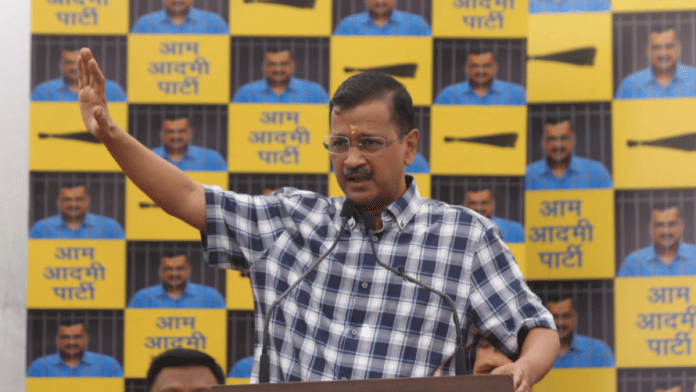New Delhi: The Supreme Court Friday granted interim bail to Delhi Chief Minister and AAP National Convener Arvind Kejriwal in the liquor policy case, and referred an important question of law regarding his arrest under the Prevention of Money Laundering Act (PMLA), 2002, to a larger bench.
A bench of Justices Sanjiv Khanna and Dipankar Datta gave the order on Kejriwal’s petition challenging his arrest under PMLA by the Enforcement Directorate (ED). The chief minister has claimed his arrest at the threshold does not meet requirements in the law.
The top court referred to a larger bench the question on the need and necessity to arrest someone under PMLA. Observing that this would require in-depth consideration, the top court granted bail to Kejriwal.
Granting him bail, the apex court said, the “right to life and liberty is sacrosanct”, and noted that Kejriwal had suffered incarceration for over 90 days. It noted that he held an important and influential position as an elected politician and left it to him to take a decision on whether he would like to continue or step down from office. “We don’t think we can give direction to an elected person,” the bench noted.
The top court clarified that Kejriwal’s release was interim in nature and would be based on similar conditions that were imposed on him when he was allowed to be out before Lok Sabha elections. The court said his regular bail shall be decided on merits and that its decision shall not be construed as findings on merits of the case.
Despite the relief, Kejriwal will remain in jail, since he is under arrest in the CBI case registered in connection with the scam. While Kejriwal has already challenged his arrest in the CBI case before the Delhi High Court, his plea for regular bail is pending in the HC. Kejriwal approached SC for regular bail in the PMLA case after the Delhi HC set aside the trial court order granting him regular bail in the matter.
Does Section 19 cover need, necessity of arrest?
The top court said that Kejriwal’s arrest met the parameters of Section 19 of the PMLA, which relates to power of arrest. It states the ED’s “Director, Deputy Director, Assistant Director or any other officer authorised in this behalf by the Central Government by general or special order, has, on the basis of material in his possession, reason to believe (the reason for such belief to be recorded in writing) that any person has been guilty of an offence punishable under this Act (PMLA), he may arrest such person and shall, as soon as may be, inform him of the grounds for such arrest.”
However, the court raised an additional ground, which is whether “need and necessity of arrest” can be read into Section 19 as one of the grounds. Holding clearly that “mere interrogation” cannot be the ground to arrest someone, it said it was necessary to determine whether “need and necessity” can be a reason to arrest under PMLA, especially in view of doctrine or principle of proportionality.
Principle of proportionality postulates that an action taken by an authority should be proportional to the results that are sought to be achieved.
The reference means that the court wants the larger bench to examine the policy or basis of an arrest that takes place on the ground that there is a need and necessity to take someone into custody.
The judges framed three questions for the larger bench, first being “whether need and necessity of arrest is a separate ground to challenge the order of arrest under section 19 of PMLA”.
The second question framed was “whether need and necessity refers to the satisfaction of the normal parameters of arrest (under Section 19) and to take a person into consideration or whether it relates to other personal grounds and reasons regarding the necessity to arrest a person in the facts and circumstances of the case”.
If the two questions were answered in the affirmative, then the larger bench would ascertain the parameters and facts that need to be taken into consideration by the court while examining the question of need and necessity to arrest, in case it is challenged by the arrested person.
The court had reserved its verdict in the matter on 17 May. Kejriwal had claimed his arrest was not in terms of the law.
Senior Advocate A.M. Singhvi appeared for Kejriwal and had questioned the investigation. According to him, the ED had ignored nine exculpatory statements of witnesses, but gave weight to one that alleged Kejriwal’s involvement.
Appearing for the ED, Additional Solicitor General S.V. Raju had denied the claims, stating that according to law, the defence of the accused cannot be looked at even at the stage of framing charges.
Concluding its arguments, the ED, which arrested Kejriwal on 21 March, also claimed it had found “personal, direct chats” between Kejriwal and a hawala operator.
ED has alleged that Kejriwal was the “kingpin” and “key conspirator” in hatching the now-scrapped excise policy in collusion with other AAP leaders, who demanded kickbacks.
The ED earlier alleged the now-scrapped excise policy was drafted “considering the favours to be granted to the “South Group”
This is an updated version of the report.
(Edited by Tikli Basu)
Also read: CBI under administrative control of Centre, rules SC on Bengal’s challenge to probes without consent







Great judgement by SC! I wish the next judgement on the question of need for arresting using PMLA should also be done soon by the SC. Finally law prevailed. The illegal misuse of power by ED, CBI on orders of the vindictive BJP leaders are curbed. For the last one a half year to two years the BJP leaders have made the lives of AAP leaders hell. In fact if BJP got majority on its own, they would have put all opposition leaders in jail. Thank God, BJP didn’t get majority and it seems their misrule is going to end soon.